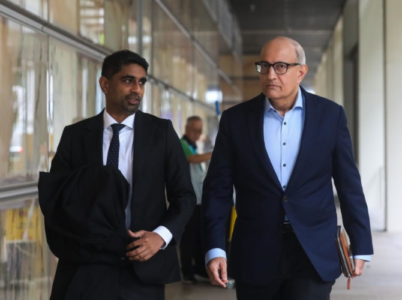The former transport minister’s legal team, led by Senior Counsel Davinder Singh, seeks disclosure of all prosecution witness statements ahead of his corruption trial.
SINGAPORE: Former transport minister S Iswaran appeared in the High Court on Friday (Jul 5), seeking an order for the prosecution to provide all statements from witnesses it plans to call at his upcoming criminal trial.
Iswaran’s legal team, led by Senior Counsel Davinder Singh, had previously been denied this request in a closed hearing in June. They renewed their bid through a criminal revision.
Prosecutors, led by Deputy Attorney-General Tai Wei Shyong, strongly opposed the move, accusing the defence of altering its stance. Justice Vincent Hoong, after a full day of arguments, reserved judgment and will deliver his decision later.
Background of the Case
Iswaran, 62, faces 35 charges, including corruption, obstruction of justice, and obtaining valuables as a public servant. These charges stem from his interactions with property tycoon Ong Beng Seng and Lum Kok Seng, managing director of Lum Chang Holdings.
The legal proceedings have drawn significant attention due to the high-profile nature of the individuals involved and the allegations of impropriety.
Defence Argument
Mr. Singh argued that under Singapore’s Criminal Procedure Code, the prosecution is obligated to disclose all witness statements, enabling the defence to adequately prepare its case.
He highlighted that withholding these statements limits the defence’s ability to effectively challenge evidence or respond to prosecution claims. Singh also questioned the prosecution’s decision to delay Ong Beng Seng’s case and prioritize Lum’s, suggesting potential prejudice against Iswaran.
“Why is my client being singled out?” Singh asked, alleging that the prosecution’s approach undermines fair trial principles.
Prosecution’s Response
Deputy Attorney-General Tai countered that the defence’s demands exceeded the prosecution’s legal obligations. He argued that the prosecution had already provided extensive evidence, including 66 statements from Iswaran and 37 from seven other witnesses.
Tai rejected allegations of procedural abuse, emphasizing the prosecution’s commitment to fairness and transparency. He noted that corruption cases often require oral testimony from key witnesses, making conditioned statements inappropriate in this context.
Legal and Procedural Implications
The outcome of this case could set a precedent for how pre-trial discovery is handled in Singapore, particularly in corruption cases involving high-ranking officials.
If convicted of obtaining valuables as a public servant, Iswaran faces up to two years’ imprisonment, a fine, or both. Convictions under the Prevention of Corruption Act carry a maximum sentence of seven years and a fine of S$100,000.
Iswaran’s trial is scheduled to begin in six weeks, with the High Court’s decision on this matter likely to impact the trial’s proceedings and strategy.








